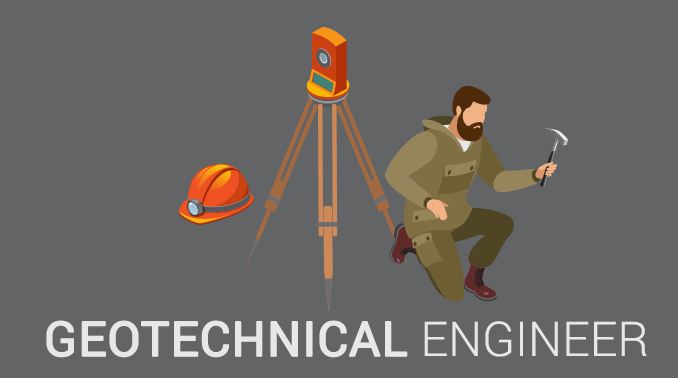The Geotheta PDFs
Table of ContentsFascination About GeothetaThe smart Trick of Geotheta That Nobody is Discussing6 Simple Techniques For GeothetaThe Main Principles Of Geotheta Indicators on Geotheta You Should Know

They carry out website investigations, accumulate examples, perform lab tests, and examine information to review the suitability of the ground for building jobs - Consulting Engineers. Based on their searchings for, geotechnical engineers offer suggestions for structure design, slope stability, retaining structures, and mitigation of geotechnical risks. They work together with other experts, such as architects, structural engineers, and building and construction teams, to ensure that geotechnical factors to consider are incorporated right into the general task layout and application
By assessing the behavior and residential or commercial properties of dirt and rock, they can recognize prospective geotechnical dangers such as landslides, dirt negotiation, or slope instability. Their know-how helps protect against failures or accidents that could endanger lives and home. Here are some comprehensive tasks and obligations of a geotechnical engineer: Website Examination: Geotechnical designers conduct website investigations to collect data on subsurface conditions.
They translate the information to comprehend the buildings and behavior of the dirt and rock, including their toughness, leaks in the structure, compaction characteristics, and groundwater conditions. Geotechnical Analysis and Layout: Geotechnical designers analyze the data collected during website examinations to analyze the stability and suitability of the site for construction projects. They execute geotechnical estimations and modeling to examine aspects such as birthing capacity, negotiation, slope stability, lateral planet stress, and groundwater circulation.
See This Report on Geotheta
Structure Style: Geotechnical engineers play an important role in designing structures that can securely support the desired framework. They evaluate the dirt conditions and tons requirements to establish the ideal foundation type, such as superficial foundations (e.g., grounds), deep foundations (e.g (https://www.producthunt.com/@geotheta1)., piles), or specialized techniques like soil enhancement. They take into consideration variables such as settlement restrictions, birthing capability, and soil-structure communication to establish ideal foundation styles
They evaluate construction plans, display site activities, and carry out field evaluations to verify that the layout referrals are complied with. If unforeseen geotechnical concerns develop, they analyze the circumstance and offer suggestions for remediation or changes to the style. Risk Assessment and Reduction: Geotechnical engineers assess geotechnical dangers and dangers connected with the project website, such as landslides, liquefaction, or soil erosion.

Cooperation and Communication: Geotechnical engineers work very closely with other professionals associated with a job, such as designers, architectural designers, and building and construction teams. Reliable communication and partnership are important to integrate geotechnical considerations into the total project design and building and construction process. Geotechnical designers provide technical know-how, answer questions, and guarantee that geotechnical requirements are met.
Getting My Geotheta To Work
Below are some kinds of geotechnical engineers: Foundation Engineer: Structure designers specialize in creating and analyzing structures for frameworks. They analyze the soil problems, tons needs, and site features to determine the most suitable foundation type and style, such as superficial structures, deep foundations, or specialized techniques like pile structures.
They examine the variables affecting incline security, such as dirt properties, groundwater problems, and incline geometry, and develop methods to stop incline failures and mitigate risks. Quake Engineer: Earthquake engineers focus on evaluating and making frameworks to hold up against seismic forces. They evaluate the seismic hazard of a site, examine soil liquefaction capacity, and develop seismic layout criteria to make sure the safety and security and strength of frameworks during earthquakes.
They execute area testing, accumulate samples, and evaluate the collected information to identify the dirt residential properties, geologic developments, and groundwater problems at a site. Geotechnical Instrumentation Engineer: Geotechnical instrumentation engineers concentrate on monitoring and determining the behavior of soil, rock, and structures. They mount and preserve instrumentation systems that keep track of variables such as soil settlement, groundwater degrees, slope activities, and architectural displacements to analyze performance and offer early cautions of prospective concerns.
Some Known Facts About Geotheta.
They conduct tests such as triaxial examinations, loan consolidation tests, direct shear tests, and leaks in the structure examinations to collect information for geotechnical analysis and style. Geosynthetics Engineer: Geosynthetics designers focus on the style and application of geosynthetic products, such as geotextiles, geogrids, and geomembranes. They utilize these products to enhance dirt stability, strengthen slopes, give drainage services, and control disintegration.
They often tend to be investigatory people, which means they're intellectual, introspective, and analytical. They are interested, systematic, sensible, logical, and logical. Some of them are also social, implying they're kind, generous, cooperative, client, caring, handy, empathetic, sensible, and pleasant - Consulting Engineer.
In the workplace atmosphere, geotechnical engineers utilize specialized software application tools to perform computations, create layouts, and examine data. They prepare records, evaluation job specs, communicate with customers and group participants, and coordinate job activities. The workplace setup gives a favorable atmosphere for research, evaluation, and collaboration with various other professionals included in the project.
The smart Trick of Geotheta That Nobody is Talking About
They often go to job sites to perform site examinations, examine geotechnical conditions, and collect data for evaluation. These brows through include traveling to various areas, in some cases in remote or difficult surfaces. Geotechnical engineers may do dirt sampling, conduct examinations, and display construction activities to ensure that the geotechnical elements of the job are being implemented correctly.
Geotechnical engineers likewise work in specialized try this website geotechnical labs. Geotechnical research laboratory designers function extensively in these environments, dealing with testing equipment, operating instruments, and tape-recording data.